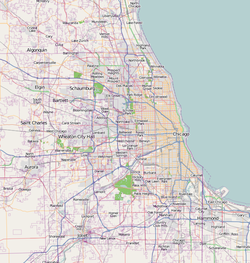This article needs additional citations for verification .(December 2014) |
Ardmore Avenue Train Station | |
 The former Ardmore Avenue CA&E station | |
| Location | 10 West Park Avenue Villa Park, Illinois |
|---|---|
| Coordinates | 41°53′0″N87°58′46.5″W / 41.88333°N 87.979583°W |
| Area | less than one acre |
| Built | 1910 |
| Architect | Ballard & Pottinger |
| NRHP reference No. | 80004525 [1] |
| Added to NRHP | November 21, 1980 |
Ardmore Avenue station is (along with Villa Avenue station) one of two former Chicago Aurora and Elgin Railroad (CA&E) stations in Villa Park, Illinois. It was listed on the National Register of Historic Places in 1980 as Ardmore Avenue Train Station.


